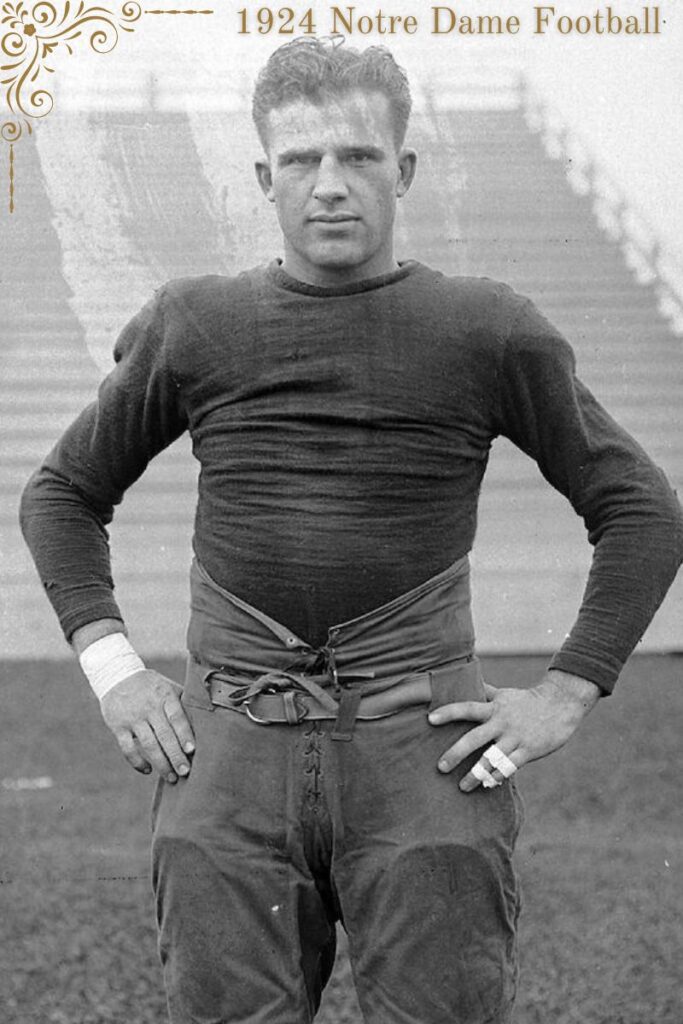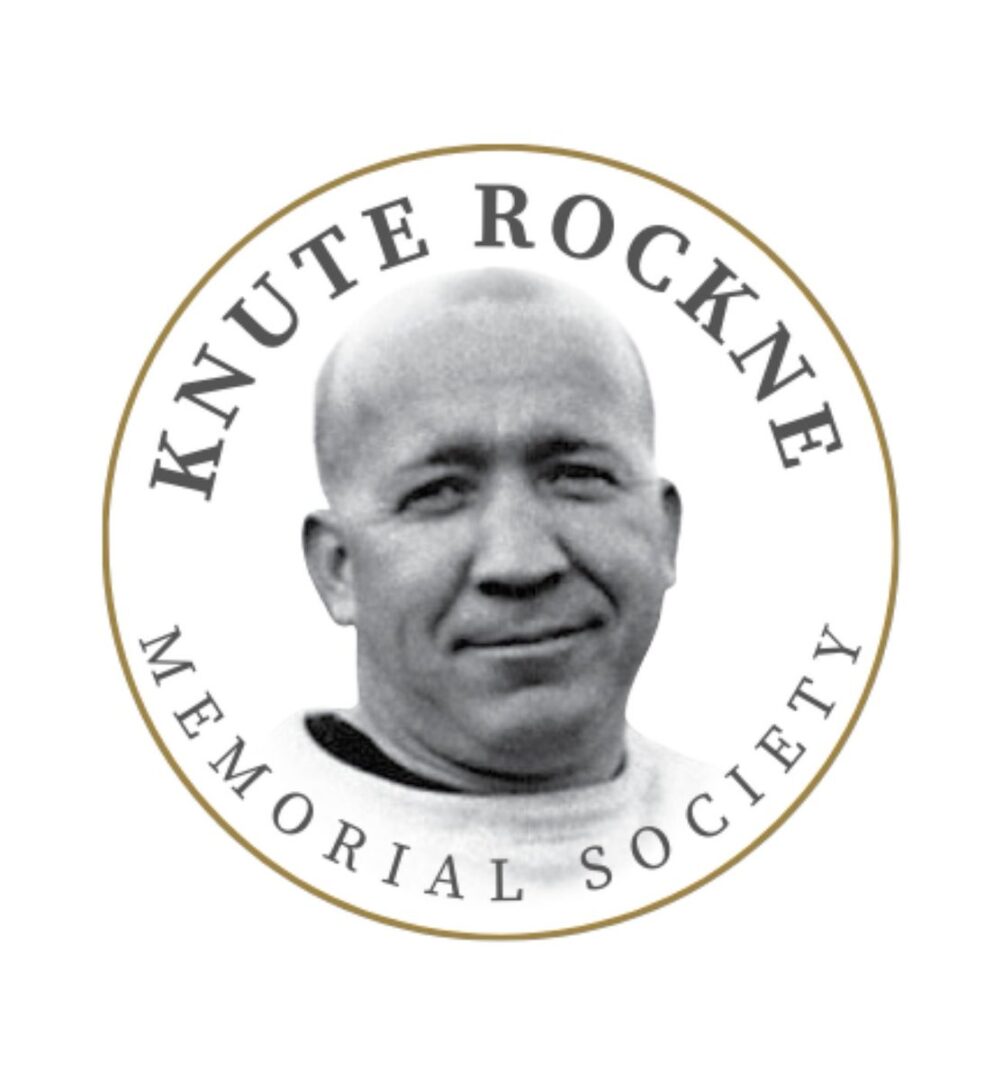
Joe bach
Left Tackle
Chisholm, MN
It’s hard to imagine a more unlikely journey to national football fame than that of Joe Bach, the regular left tackle for Notre Dame’s 1924 national champions.
Born and raised on the rugged Mesabi Iron Range of northern Minnesota, Bach came from a family and a town steeped in iron ore mining. His parents came from the Austro-Hungarian empire, among thousands who immigrated to the Iron Range in the late 19th century, creating the most varied ethnic stew outside of the major United States cities.
The couple settled in the Shenango location, one of the myriad mining camps in the area. Joe Sr. began working in the mines, and later the family operated a boarding house for miners, before moving into the town of Chisholm. It was a hard life for the Bachs and their four children. Houses built by the mining company and rented to the miners had no indoor plumbing aside from a cold water tap in the kitchen.
Despite the austere conditions at home, Chisholm’s schools were a different story. Heavily funded by the tax base of the mining companies, they were advanced, with well-furnished classrooms, excellent instructors, a “college prep” curriculum and extensive activities.
Improving the public’s health was also a high priority. Chisholm schools not only had a school nurse, but starting in the fall of 1917—as Joe Bach entered Chisholm High—a school doctor as well. A young Dr. Archibald “Moonlight” Graham saw an ad for the Chisholm schools’ doctor position and traveled from his home in North Carolina for an interview.
Doc Graham had a background that included a stint in organized baseball. A farmhand of the New York Giants, he was called up to the big leagues late in the 1905 season and got into one game, playing one half inning in right field. After the season, he left baseball and began his march toward a degree in medicine. His story was immortalized in the film Field of Dreams.
For Joe Bach, sports were an outlet for an active, sometimes rambunctious youth. Joe was just six when his father died, and in Joe’s teenage years, his exuberance once got the better of him, resulting in a brief visit to the Minnesota Training School in Red Wing. But he rebounded from that episode, focusing his considerable energy into sports of all kinds.
Back in Chisholm, Bach named himself captain of the school’s newly-formed swimming team, and was also a splendid running back in football and a major force in basketball. It was basketball that first brought him attention outside the Iron Range. In his sophomore year, 1918-19, he poured in 15 field goals in a 60-5 win over Biwabik. The team won its District title.
The State Tournament was held not in Minneapolis or St. Paul, but the small town of Northfield, at Carleton College. Bach was named second-team all-state, and was noticed by Carleton football coach Cub Buck, who invited Bach to attend the “Harvard of the Midwest.” Freshmen were allowed to play on Carleton’s varsity, so in the 1921 football season, Bach started at right half. He was a bruising, powerful runner, and helped Carleton to a successful campaign.
Bach’s play in a hard-fought battle with rival St. Thomas College in St. Paul caught the eye of the St. Thomas coach, former Notre Dame quarterback Joe Brandy. He and others convinced Bach he could excel on a larger stage and after one semester at Carleton, Bach reached a pinnacle few back in Chisholm could have imagined, when he transferred to Notre Dame.
While sitting out the 1922 Irish season due to transfer rules, Bach’s willingness to contribute led him to a role as a trainer/manager, and he endeared himself to Coach Knute Rockne. By the fall of 1923, Bach was ready to go. When regular left tackle Gus Stange broke his leg in the Army game, Bach took over and excelled. Reported the Scholastic: “Bach ascended the ladder of fame by leaps and bounds after the Army game, and was called the tackle find of the year. His massive strength rose to immeasurable proportions in front of the Army line, paving the way for another triumph.”
Added the 1924 Football Review: “His powers of courage are the equal of any which have ever been displayed in football. He was a hard and sure tackler and it was not an uncommon sight to see Bach throw the offensive ball carrier for a loss.”
His strength and consistency were keys in helping the Irish to a 10-0 record, a Rose Bowl triumph over Stanford and near unanimous acclimation as 1924 national champions.
Bach began his long coaching career as an assistant at Syracuse in 1925, then moved to Duquesne in 1929 to assist head coach Elmer Layden, his ND teammate. When Layden took over as Irish head coach in 1934, Bach succeeded him for one season leading the Dukes, before a two-year stint as head coach of the NFL’s Pittsburgh Pirates.
Bach guided the Niagara Purple Eagles for five seasons (1937-41), winning four conference titles, then coached at Fort Knox in 1942. He spent several more seasons as an NFL assistant, before guiding the Steelers in 1952-53. He remained in the Steelers family as a scout for years.
On Oct. 24, 1966, an athletic banquet in Pittsburgh’s Hotel Roosevelt honored Bach with induction into the Hall of Fame of a local coaches group. Only a few minutes after the conclusion of the event, Bach collapsed and died of a massive heart attack.
Among Bach’s legacies was his best friend from Chisholm, Alfred Maturi, son of an Italian immigrant miner. Before his senior year at Chisholm High, Maturi suffered a serious leg injury working for his family’s construction company, and his athletic pursuits ended. However, influenced by Bach’s success in South Bend, all four of Maturi’s sons attended Notre Dame.
They include Joel Maturi ’67, who served as student trainer for the 1966 ND football national champions. Joel went on to a highly successful career as an athletic administrator at the University of Wisconsin, Denver, Miami of Ohio and the University of Minnesota. He was honored with the Leadership Award at the 2021 Knute Rockne Spirit of Sports Awards.
Donate
Support the work of the Knute Rockne Memorial Society with a tax-deductible donation today.
Subscribe
Join our email list to receive the latest news and posts from the Knute Rockne Memorial Society.
